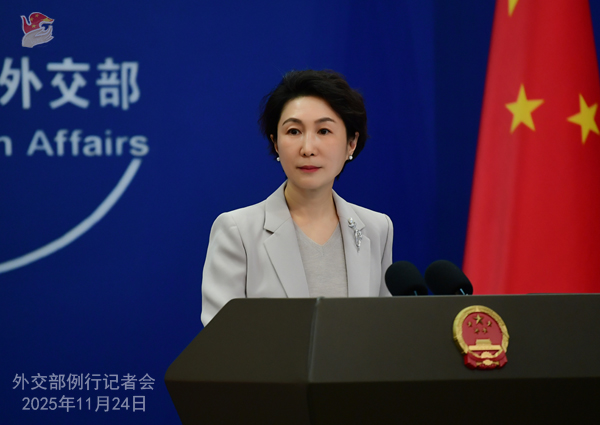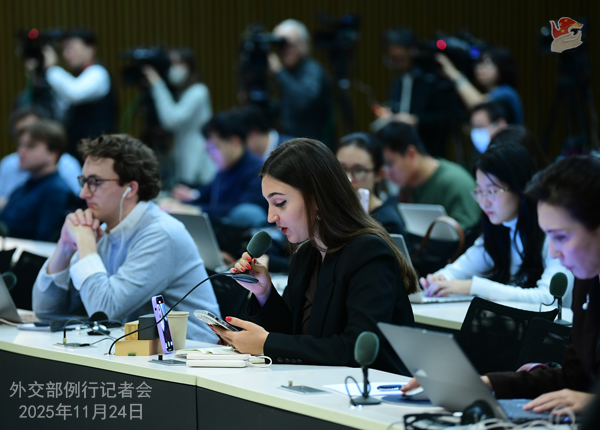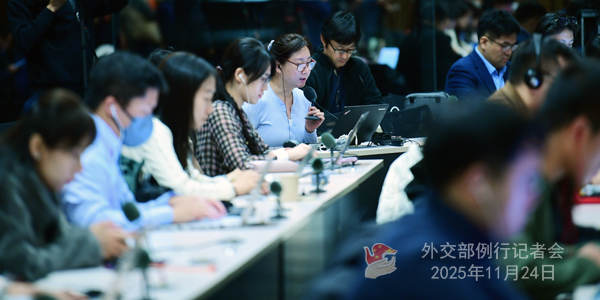
People’s Republic of China


Xinhua News Agency: Leaders of the G20 attended the 20th G20 Summit in Johannesburg, South Africa. The summit attracted wide attention amid growing concerns on whether G20 could continue its leading role in global multilateral governance. Could you share more information on China’s participation?
Mao Ning: The summit is held under the theme of “solidarity, equality and sustainability.” Premier Li Qiang attended and addressed the summit. He pointed out that over the past 20 years since the establishment of the G20, members of the group have come together to tackle challenges and promote global development and progress, and the key lies in the word “solidarity.” Now, the world economy once again faces great challenges. Unilateralism and protectionism run rampant. The G20 should look for solutions and bring all parties back onto the right track of solidarity and coordination.
Premier Li Qiang stressed that the world economy is now deeply integrated, and no country can thrive alone. Only openness and cooperation can produce mutual benefit. The G20 should firmly uphold free trade and work for an open world economy. Differences should not become obstacles to solidarity, still less excuse for suppression. Legitimate concerns of all sides should be addressed through equal-footed consultation. The G20 should take the lead in upholding multilateralism, boost the voice of developing countries, and work for an international economic and trade order that is more fair and open. China stands ready to work with parties in solidarity to take concrete and persistent actions to play a bigger role in reforming and improving global governance and promoting economic growth and to create a bright and prosperous future.
CNR: It’s reported that regarding China’s letter to the UN Secretary-General on Japanese Prime Minister Sanae Takaichi’s erroneous remarks on Taiwan, the Japanese government spokesperson said to reporters during the G20 Summit that China’s claims that Prime Minister Takaichi has altered Japan’s position on Taiwan is “entirely baseless.” The spokesperson said Japan has repeatedly explained to the Chinese side the gist of the remarks and Japan’s consistent position, and added that Tokyo is “committed to dialogue” with China. What’s China’s response?
Mao Ning: China has articulated its position multiple times on Japanese Prime Minister Sanae Takaichi’s erroneous remarks on Taiwan. Those remarks seriously violate the principles laid down in the four political documents between China and Japan, and has fundamentally eroded the political foundation of China-Japan relations.
We’ve noted the Japanese side’s reference to Japan’s “consistent position” on the Taiwan question. But what exactly do they mean by this so-called “consistent position?” Can Japan articulate this “consistent position” in its entirety to the public? If Japan merely keeps repeating that its position has not changed without specifying what that position is and meanwhile keeps crossing the line, then this kind of repetition means nothing but empty words, and simply fudges and hollows out the one-China position.
The one-China principle is an unshakable prevailing consensus in the international community. If there has truly been no change to the Japanese government’s position on the Taiwan question, Japan should unequivocally uphold the one-China principle, and abide by the spirit of the four political documents between the two countries and honor the commitments Japan has made, including what has been stated in the 1972 Sino-Japanese Joint Statement that “the Government of Japan recognizes the Government of the People’s Republic of China as the sole legal Government of China,” and “the Government of the People’s Republic of China reiterates that Taiwan is an inalienable part of the territory of the People’s Republic of China. The Government of Japan fully understands and respects this stand of the Government of the People’s Republic of China, and it firmly maintains its stand under Article 8 of the Potsdam Proclamation.” Why can’t Japan fully and accurately reiterate this position?
China urges the Japanese side to take seriously what it has heard from China, do serious soul-searching and correct its wrongdoing, act to honor its commitment to China, and stop pursuing its misguided course, still less say one thing but do another.
RT TV: At the recent EU Indo-Pacific Ministerial Forum, the EU High Representative for Foreign Affairs and Security Policy Kaja Kallas talked about the Ukraine peace plan and said that China and Russia are working together to overhaul the global economic and security order. What’s China’s comment?
Mao Ning: China and Russia grow bilateral relations and carry out practical cooperation under the principle of non-alliance, non-confrontation and not targeting any third party and work for world peace and development.

Reuters: I want to ask about the comments by the Japanese defense minister over the weekend who said about the deployment of the missile unit to the Yonaguni Island. He said that medium-range surface-to-air missile units were planned to deploy in Yonaguni to protect the island’s safety. “We believe that having this unit in place will actually lower the chances of an armed attack against our country, so I don’t agree with the argument that this deployment will increase tensions in the region.” What’s your comment to the remarks by Mr. Koizumi?
Mao Ning: Japan’s deployment of offensive weapons in Southwest Islands close to China’s Taiwan region is a deliberate move that breeds regional tensions and stokes military confrontation. Given Japanese Prime Minister Sanae Takaichi’s erroneous remarks on Taiwan, this move is extremely dangerous and should put Japan’s neighboring countries and the international community on high alert.
The Potsdam Proclamation explicitly stipulates that Japan shall not be permitted to “re-arm for war.” The Japanese Constitution, which enshrines pacifism, also established Japan’s exclusively defense-oriented policy. It is alarming, however, that in recent years, Japan has drastically readjusted its security policy, increased defense budget year after year, relaxed restrictions on arms export, sought to develop offensive weapons, and planned to abandon its three non-nuclear principles. Japan’s right-wing provocateurs are trying every means to break free from the pacifist constitution, going further down the path of military buildup and leading Japan and the region to disastrous outcomes.
This year marks the 80th anniversary of the victory of the Chinese People’s War of Resistance Against Japanese Aggression and the recovery of Taiwan. China will never allow Japan’s right-wing provocateurs to turn back the wheel of history, never allow external forces to lay their hands on China’s Taiwan region, and never allow the resurgence of Japan’s militarism. China is resolved in and capable of defending national and territorial sovereignty.
China Daily: The recently concluded COP30 of the UNFCCC reached the Belém Political Package. Countries agreed to work together to accelerate climate action, consider barriers related to the role of trade, and urge developed country Parties to increase the trajectory of their collective provision of climate finance for adaptation to developing country Parties. UN Secretary-General António Guterres also issued a statement commending the progress delivered at COP30. What is China’s comment?
Mao Ning: COP30 of the UNFCCC was concluded in Belém, Brazil on November 22. After two weeks of strenuous negotiations, parties reached the Belém Political Package that is positive and balanced, displaying their determination to work in solidarity and cooperation on addressing climate change, and providing certainty for the implementation of the UNFCCC and the Paris Agreement in the next decade. It needs to be noted that, heeding the call of developing countries, the conference decided, for the first time, to hold a dialogue on climate change related trade-restrictive unilateral measures within the UNFCCC process, and develop a just transition mechanism, which is of milestone significance.
The Chinese government attaches great importance to the conference. President Xi Jinping’s Special Representative, Member of the Standing Committee of the Political Bureau of the CPC Central Committee and Vice Premier of the State Council Ding Xuexiang attended and addressed the Belém Climate Summit. In his speech, he put forward three propositions, namely, keep to the right direction, translate climate commitments into action, and deepen openness and cooperation, setting a positive note for the conference. The Chinese delegation had full and in-depth participation in the negotiations and consultation on various agenda items, and worked for positive outcomes at the conference. “Striving to do better,” which was proposed in the outcome document of COP30, has become the most important political message for global climate governance in the next ten years, and this was originally said by President Xi Jinping at the UN Climate Summit.
China will work with other parties to fully implement the outcomes of the conference, advance global cooperation on addressing climate change, and jointly build a clean and beautiful world.
NHK: Japan’s Prime Minister Takaichi said after G20 Summit that she didn’t have the chance to talk to Premier Li Qiang, and she also commented that Japan remains open to various dialogue with China. Could you tell us your comment on this?
Mao Ning: Japan should take China’s concerns seriously, retract the erroneous remarks on Taiwan, and show Japan’s sincerity for dialogue with concrete actions.
Beijing Daily: Torrential rain and flooding triggered by multiple typhoons have hit Viet Nam recently, causing casualties and loss of property. What’s China’s comment? Are there any Chinese people affected? Will China assist Viet Nam in disaster relief?
Mao Ning: We are aware that recent typhoons and flooding have caused casualties and economic loss in various parts of Viet Nam.
In a humanitarian spirit and out of friendship and goodwill towards the Vietnamese people, China is set to provide cash assistance to Viet Nam. We believe that under the leadership of the CPV and the Vietnamese government, those affected will recover from the disaster and rebuild their homes at an early date. According to our information, so far there have been no Chinese casualties.
NHK: Some Japanese media reported yesterday that China has rejected Japan’s proposal to hold a trilateral meeting with South Korea and Japan in January. Can the Foreign Ministry give us any comment on this?
Mao Ning: China, Japan and the ROK have not agreed on a date for the tenth trilateral summit meeting. The Japanese leader’s erroneous remarks on Taiwan have damaged the foundation and atmosphere for China-Japan-ROK cooperation. Conditions are not right at the moment for a trilateral summit meeting.




